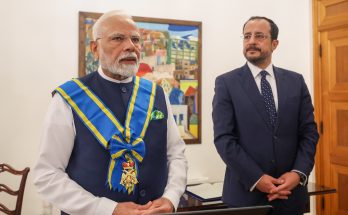
The Quad Moment is finally here, with President Joe Biden going out of his way to host the first face-to-face summit of the leaders of the four like-minded democracies in Washington amid the persistence of the coronavirus pandemic in his country.
Quad vaccines ‘Made in India’
Going by the buzz, the first in-person Quad summit of Joe Biden, India’s Prime Minister Narendra Modi, Japan’s PM Yoshihide Suga and Australian PM Scott Morrison, on September 24 will be more than a glitzy photo-op and may just culminate in transformative outcomes that elevate a diplomatic event beyond hype. Operationalizing the Quad Vaccine Initiative, with the goal of producing a billion anti-corona vaccines at a facility in India, will be a tangible outcome that will connect the Quad to the lives of millions across geographies. In a sense, Joe Biden has already announced his intention to make good the Quad vaccine promise in his address at the global vaccine summit. The leaders may like to brand these vaccines as “Made by Quad” to take ownership of this giant philanthropic project of helping and healing. Prime Minister Modi, an ardent nationalist and relentless promoter of Brand India, may pitch for the tag: “Made by Quad in India,” a subtle variation of his pet Make in India project that could conjure up a vision of the Quad partnering in India’s rise.
China, elephant in the room
Forging a dedicated supply chain initiative for manufacturing of semiconductors could be another substantive outcome that is being designed to secure the Quad countries against heavy dependence on China for this critical chip. Setting up Quad norms for development of emerging technologies could also provide more flesh to the grouping, and reinforce the predominant impression of the Quad being targeted at a rising and disruptive hegemon.
China will be the imposing elephant in the room where the leaders of the four Quad countries will be forging a new template of cooperation among like-minded democracies. But in an exercise which will make euphemism a genre of creative expression in itself, there will be no mention of China in either televised statements of the leaders or in iteration of their shared vision in the joint statement. Rest assured – a sanitised joint statement can’t hoodwink uber-nationalists of the Global Times, the eyes and ears of the CPC.
AfPak convergence
The in-person Quad summit will see deepening of the agenda beyond what was enunciated at the first virtual summit in March. This time around, one can expect more geopolitical content and gravitas. The brutal takeover of Afghanistan by the Taliban and the full-blown geopolitical upheaval and humanitarian crisis it has unleashed will figure high on the agenda. The Quad summit, with strong push from President Biden, is expected to lay out prescriptive criteria for a hard-line Islamist militia seeking international legitimacy and recognition. In a vindication of India’s long-standing concerns, the Quad is also expected to put Pakistan on notice in case the powers-that-be in Islamabad and Rawalpindi plan to continue with their insidious games of cross-border terror. The twin AfPak migraine will also dominate bilateral talks between PM Modi and President Biden during their first in-person meeting in the White House.
AUKUS-pocus!
Only a week ago, the Quad seemed destined for its finest moment, after a thousand visions and revisions over the past few years. But this was a classic case of a lull before the storm, as the cliché goes. Just when there was a lot of preening about the Quad in strategic circles, President Biden sprang a surprise by announcing a trilateral security partnership with trusted allies, Australia and UK at a televised virtual event at the White House. The glowing faces of Biden, Johnson and Morrison on TV screens reeked of a new resolve to take on a China which has now been typecast with a string of tautologies – aggressive, assertive and belligerent – you can pick your favourite adjective.
It takes perfervid imagination to package a hard-headed business deal as a giant leap of faith, but while a lot remain shrouded in uncertainty it’s clear that the US and Australia have decided that it’s time to move beyond words to target China with nuclear-powered submarines! This is called hitting Down Under or hitting under the water. France promptly called it “a stab in the back” as AUKUS, which rhymes with hocus pocus, was no pantomime but a loss of around $50 billion for Paris.
Quad versus AUKUS

The precipitate formation of the AUKUS has triggered quibbles much like scholastic debates in medieval times about the adverse impact of AUKUS on Quad. Will AUKUS rob Quad of its sheen and moment under the sun? – goes the overwhelming question. Don’t let your paranoia run riot – Quad and AUKUS are not as different as chalk and cheese but they are two different kind of chalk which will write a different script on the geopolitical slate.
Diplomats can sometimes be ponderous and heavy-footed in their diplomatese. But India’s Foreign Secretary Harsh Vardhan Shringla should be credited with clear-seeing and clear thinking. “The QUAD and the AUKUS are not groupings of a similar nature. The QUAD is a plurilateral grouping, a group of countries that have a shared vision of their attributes and values. They also have a shared vision of the Indo Pacific region as a free, open, transparent, inclusive region,” said Mr Shringla when asked about Quad and AUKUS. “On the other hand, AUKUS is a security alliance between three countries. We are not party to this alliance. From our perspective, this is neither relevant to the QUAD, nor will it have any impact on its functioning.”
To rephrase and re-conceptualise, Quad is about pushing back against China in business-related areas such as development of vaccines and 5G technology in which billions of dollars are invested. Quad, in this sense, is about the democratic world’s soft power pushback against China’s big power ambitions. AUKUS, on the other hand, is clearly about military force projection and countering perceived Chinese aggression in a muscular and tit-for-tat. Whichever way it pans out, the stirring of this new geopolitical soup will ensure more interesting times in days and months to come.
(Manish Chand is CEO-Founder of India Writes Network and Director, Centre for Global India Insights, a think tank focused on geopolitics and emerging world order. He is also Editor-in-Chief, India and The World, a pioneering magazine-journal focused on global affairs)
Author Profile

- Manish Chand is Founder-CEO and Editor-in-Chief of India Writes Network (www.indiawrites.org) and India and World, a pioneering magazine focused on international affairs. He is CEO/Director of TGII Media Private Limited, an India-based media, publishing, research and consultancy company.
Latest entries
 India and the WorldJune 16, 2025Amid Pakistan-Turkey nexus, Cyprus joins India against cross-border terror
India and the WorldJune 16, 2025Amid Pakistan-Turkey nexus, Cyprus joins India against cross-border terror India and the WorldMay 8, 2025Pahalgam payback: India exposes Pakistan’s lies, misuse of religious sites for training terrorists
India and the WorldMay 8, 2025Pahalgam payback: India exposes Pakistan’s lies, misuse of religious sites for training terrorists India and the WorldMay 3, 2025IMEEC provides a democratic alternative to BRI: Italy’s former foreign minister (Interview)
India and the WorldMay 3, 2025IMEEC provides a democratic alternative to BRI: Italy’s former foreign minister (Interview) India and the WorldApril 21, 20253T Template for India-US Mega Partnership
India and the WorldApril 21, 20253T Template for India-US Mega Partnership







